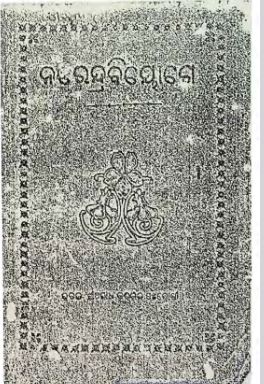Narendra Biyoge, an eminent piece of literary art, penned by the illustrious Odia poet Agadhu Kabichandra Patjosi, stands as a timeless monument to the human experience of loss and remembrance. Within its pages, the sub-poem “Memory” exceptionally encapsulates the poignant reflection on memories that remain etched in the heart, long after the loved one has departed.
“Memory,” as a sub-poem within the larger framework of Narendra Biyoge, presents a delicate yet profound exploration of the ever-enduring impact of cherished memories. Patjosi’s nuanced writing breathes life into the abstract concept of memory, transforming it into a palpable entity that readers can feel and touch through the rhythms of his verses.
The poem opens with a vivid portrayal of reminiscence. Patjosi’s words paint an evocative tapestry of moments shared with Narendra, now immortalized in memory. The imagery used is both evocative and illustrative, allowing readers to envision scenes of pastoral beauty and intimate encounters that transcend the mundane. Through subtle nuances, Patjosi conveys the sweetness and the sorrow entwined within the folds of memory, creating a dichotomy that is both heartwarming and heart-wrenching.
In “Memory,” Patjosi seamlessly bridges the personal with the universal. While the poem is deeply rooted in personal grief and longing, it resonates on a broader spectrum, touching on the universal experience of loss. Every reader who has ever felt the pangs of losing a loved one finds solace and camaraderie in Patjosi’s expression. The emotional depth of the verses underscores the poet’s skill in tapping into the collective human consciousness, making “Memory” an ode to all who cherish lost loved ones in the quiet recesses of their minds.
Patjosi’s poetic style in “Memory” is distinguished by its elegant simplicity. The language is both lyrical and accessible, allowing readers from various walks of life to connect with the emotions conveyed. The use of traditional Odia prosody, coupled with contemporary sensibilities, lends the poem a timeless quality. Metaphors and similes are deployed with precision, each line meticulously crafted to evoke deep emotional responses.
“Memory” delves into themes of eternal connection and the indelible marks left by loved ones. Patjosi eloquently argues that memory is not merely a reflection of the past but a living entity that continues to shape the present and influence the future. The poem suggests that through memory, the essence of Narendra is preserved and continues to accompany the poet, blurring the boundaries between past and present, life and afterlife.
In conclusion, “Memory” from Narendra Biyoge is a masterful sub-poem that encapsulates Agadhu Kabichandra Patjosi’s exceptional ability to articulate the depths of human emotion. Through his reflective and poignant verses, Patjosi offers readers an intimate glimpse into the enduring power of memory. The universal relatability of the poem, combined with its lyrical beauty, makes “Memory” a timeless piece that speaks to the heart long after the final line has been read. Patjosi’s work is not just a tribute to Narendra but to the enduring human spirit and its capacity to love, remember, and find solace in memory.
Books Info
| Books name | Narendra Biyoge/ନରେନ୍ଦ୍ରେ ବିୟୋଗ |
| Editor | Agadhu Kabichandra Patjosi |
| No Of pages | 18 |
| Publisher | NA |
| Publication | 1976 |
| Printed At | NA |
| Distributor | NA |

